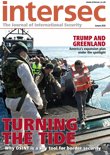Dr David Abrutat asks why Chinese counter-insurgency efforts are failing to subdue Uighur Separatism in Xinjiang province In the early morning hue of bustling vegetable market stalls, a scene of horror unfurled as two vehicles ploughed through the crowds. The attack on a shopping street in central Urumqi on 22 May 2014 was another… Read more »
Posts By: Jacob Charles
Curing PREVENT
Anthony Tucker-Jones reports on Britain’s counter-radicalisation strategy and asks whether it still working In 2014 the UK’s highly controversial Prevent counter-radicalisation strategy was rocked by allegations that militant Islam had set up shop in Birmingham’s state schools. The so-called “Trojan Horse” plot highlighted the ongoing failure to safeguard the country’s young Muslims from an… Read more »
The heat of the night
David Lee assesses the value of thermal imaging technology for border security and critical infrastructure protection, and offers advice on selecting the right system for each application Border security and coastal surveillance are 24/7 operations that can’t afford downtime or periods of reduced readiness. Guarding against illegal immigration, smuggling, and terrorism demands reliable long-range… Read more »
Resurgence of the right
Amid reports of a rise in attacks linked to right-wing extremism on both sides of the Atlantic, John Chisholm examines the motivations of those driven to kill for their views In Europe and the United States, a new generation of right-wing political groups has arisen. Anti-Islam, anti-globalisation, anti-progressive, these movements have often resorted to… Read more »
Spreading instability
Lina Kolesnikova warns that political and social instability will continue to spread across the Middle East and North Africa, and argues that civil society could play a key role in pushing back Islamist hegemony Last year, four Arab countries – Syria, Iraq, Libya, and Yemen – joined the sad list of failed states whose… Read more »
Blocked in
Rolf Gebhardt and Norman Gregory examine the problem obstructing vehicles present to IEDD officers attempting to defuse a VBIED, and outline a new vehicle-moving system which could save valuable time and even lives Each new terrorist attack committed around the world, and each renewed statement by international terror groups about their intentions to continue… Read more »
Inside explosive effects
Dr John Wyatt examines how stand off solutions and blast mitigation can be designed into vulnerable buildings to protect personnel and property from the explosive effects of VBIEDs The use of explosives by terrorists, extremists or individuals has not abated despite increased security measures and procedures. The current threat level in the UK is “Substantial”… Read more »
Instability Africa
John Chisholm looks deeper into the unrest spreading across the continent, and asks to what extent Western policies are sowing the seeds for long-term instability While the world focuses on the headline-grabbing issues in Ukraine and the increasingly brutal behaviour of ISIS, Africa is still bedevilled with internal dissent that challenges governments whose authority… Read more »
March of the caliphate
Anthony Tucker-Jones charts the alarming expansion of the Islamic State terror group Osama bin Laden, the late leader of al-Qaeda, dreamed of the return of the 7th Century Islamic Caliphate that once stretched across the Middle East and North Africa. Such aspirations were a dream in the face of the realities of geopolitics –… Read more »
Collaborative EOD
Chanan Levin discusses the latest challenges faced by EOD operatives working in urban areas, and calls for an international IED database to share research and experience In recent years, improvised explosive devices (IEDs) have become more widespread. As terrorist networks grow internationally, extremists from around the world turn to the Internet to learn how… Read more »








